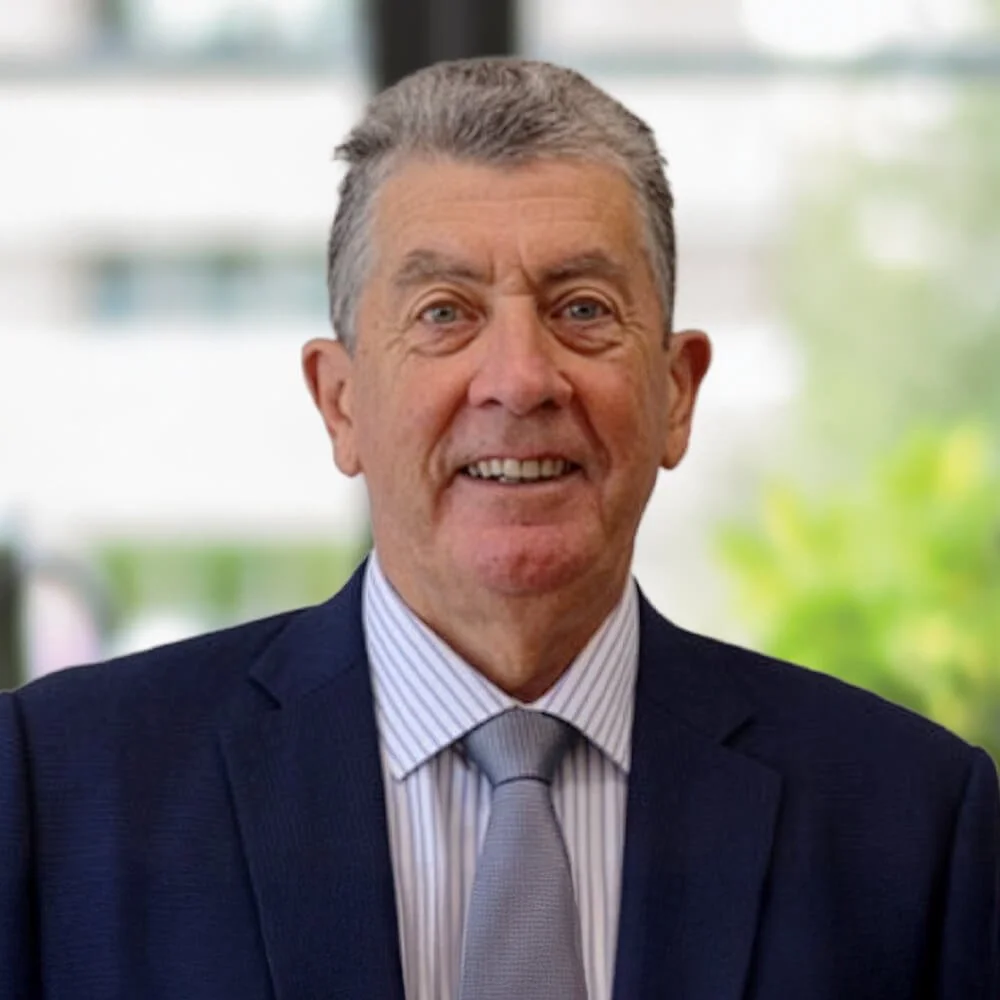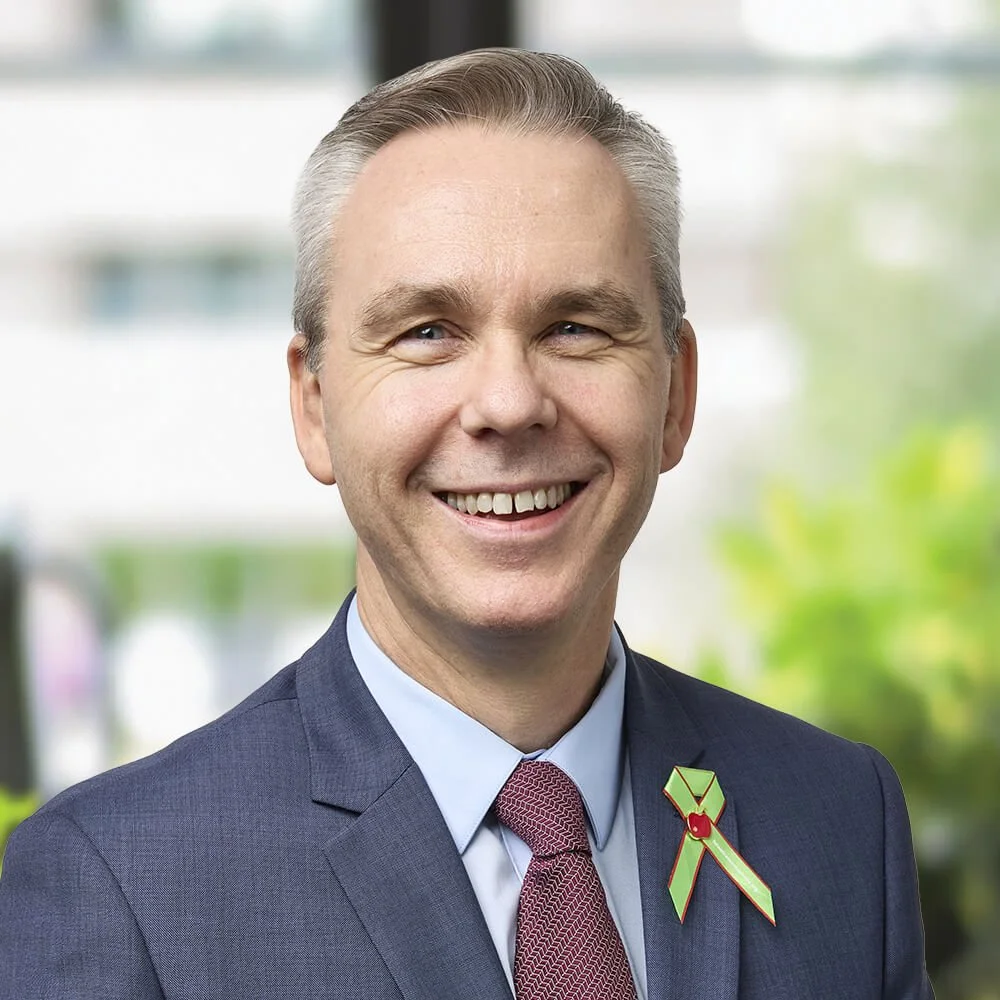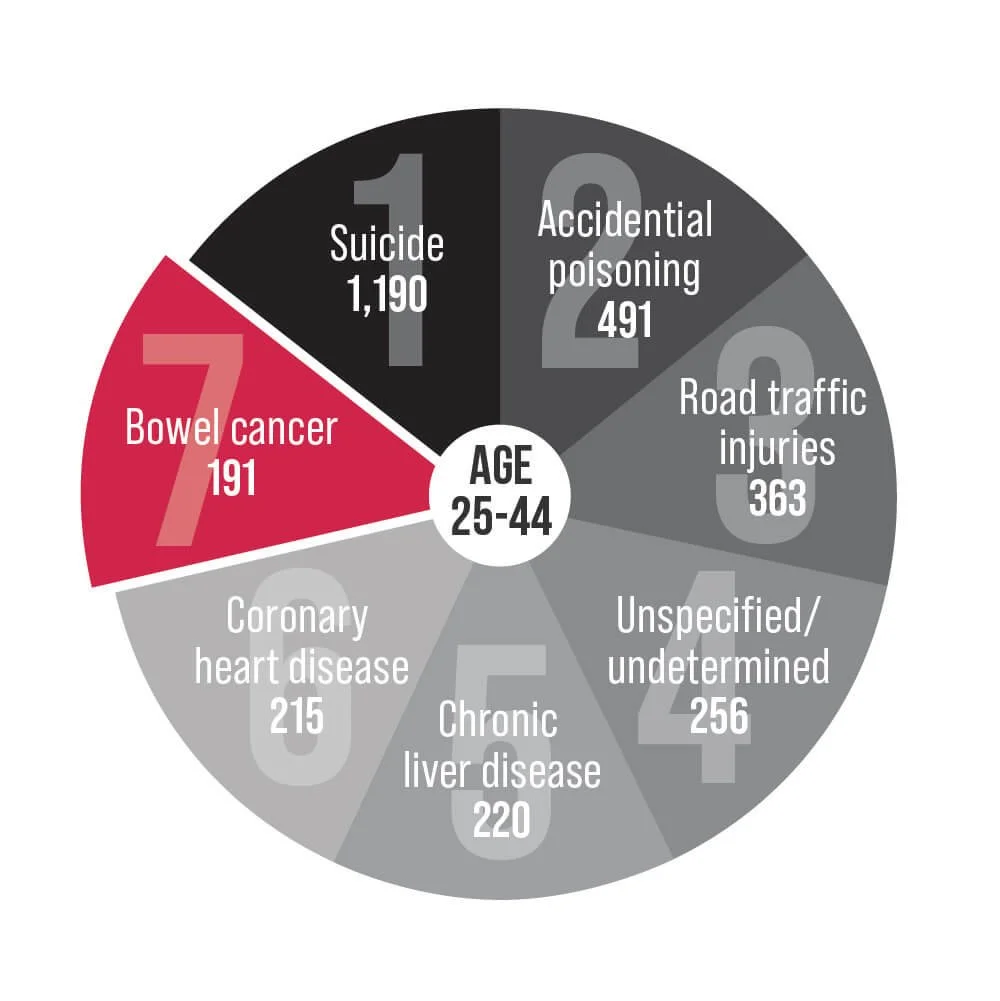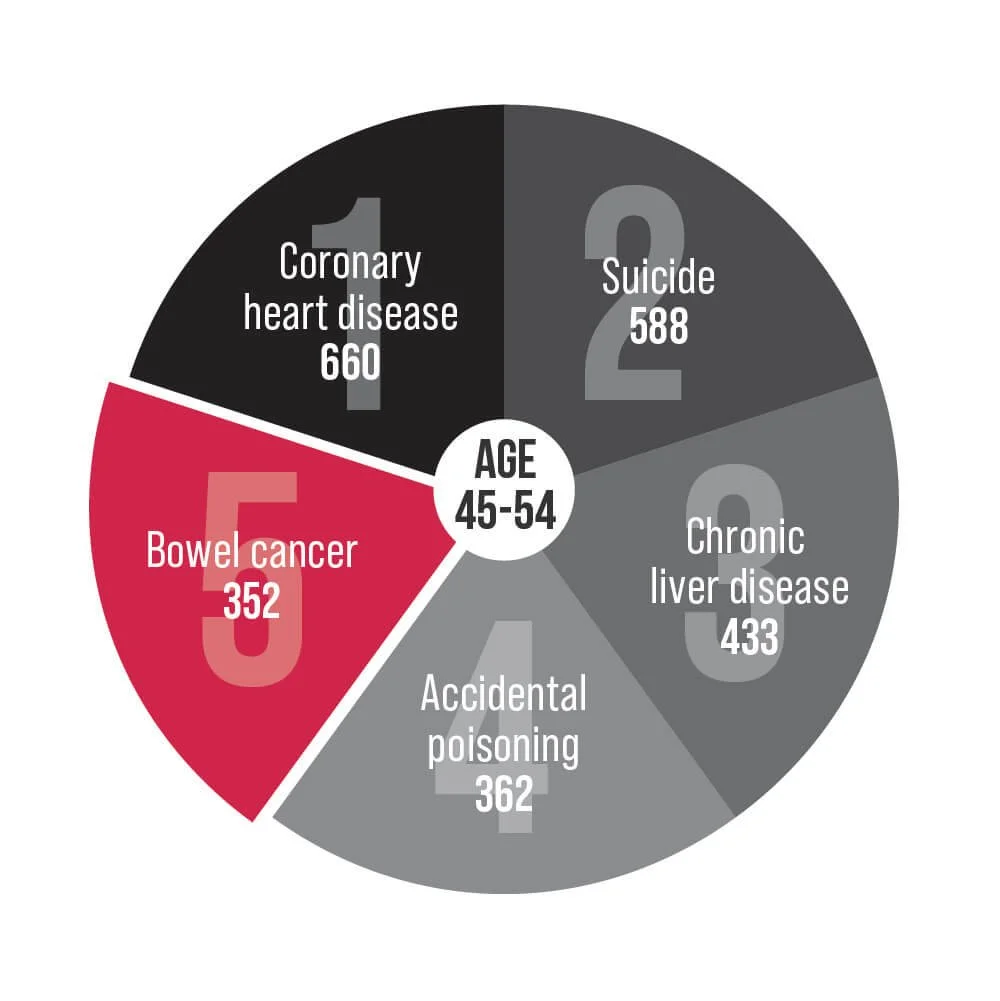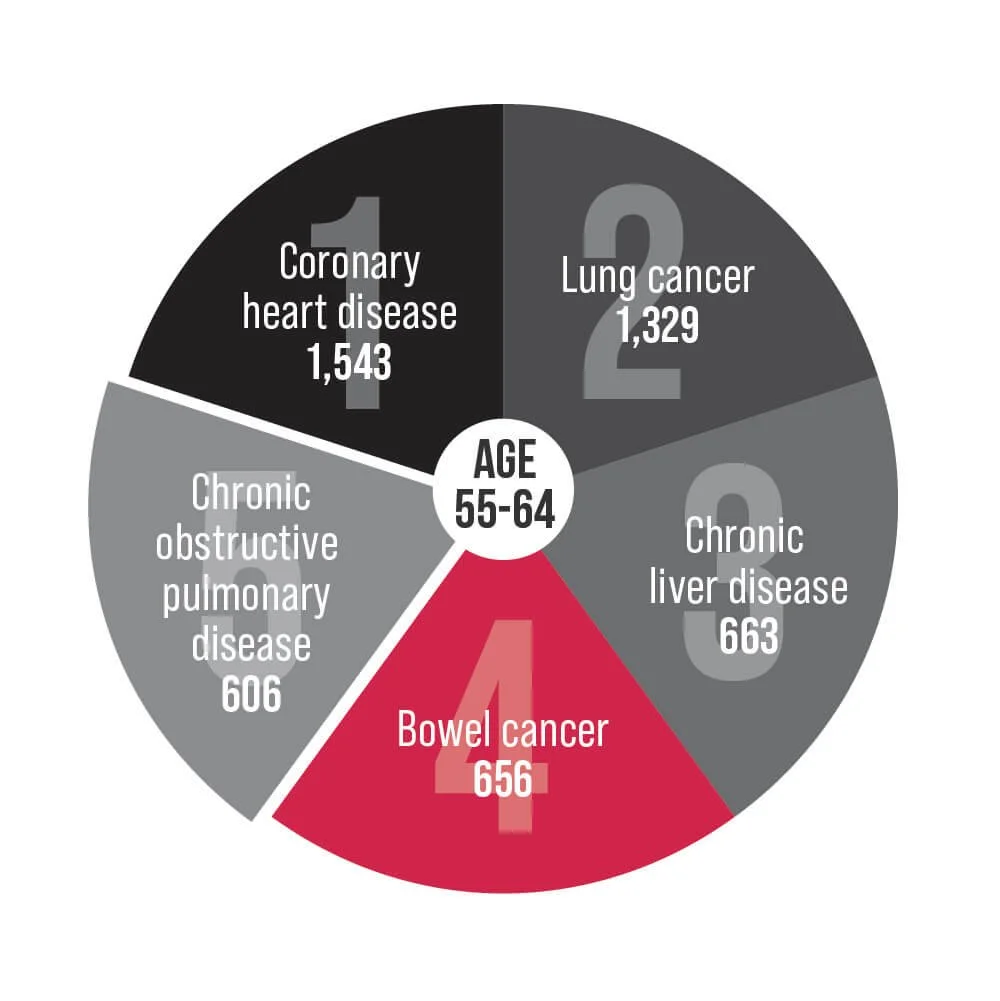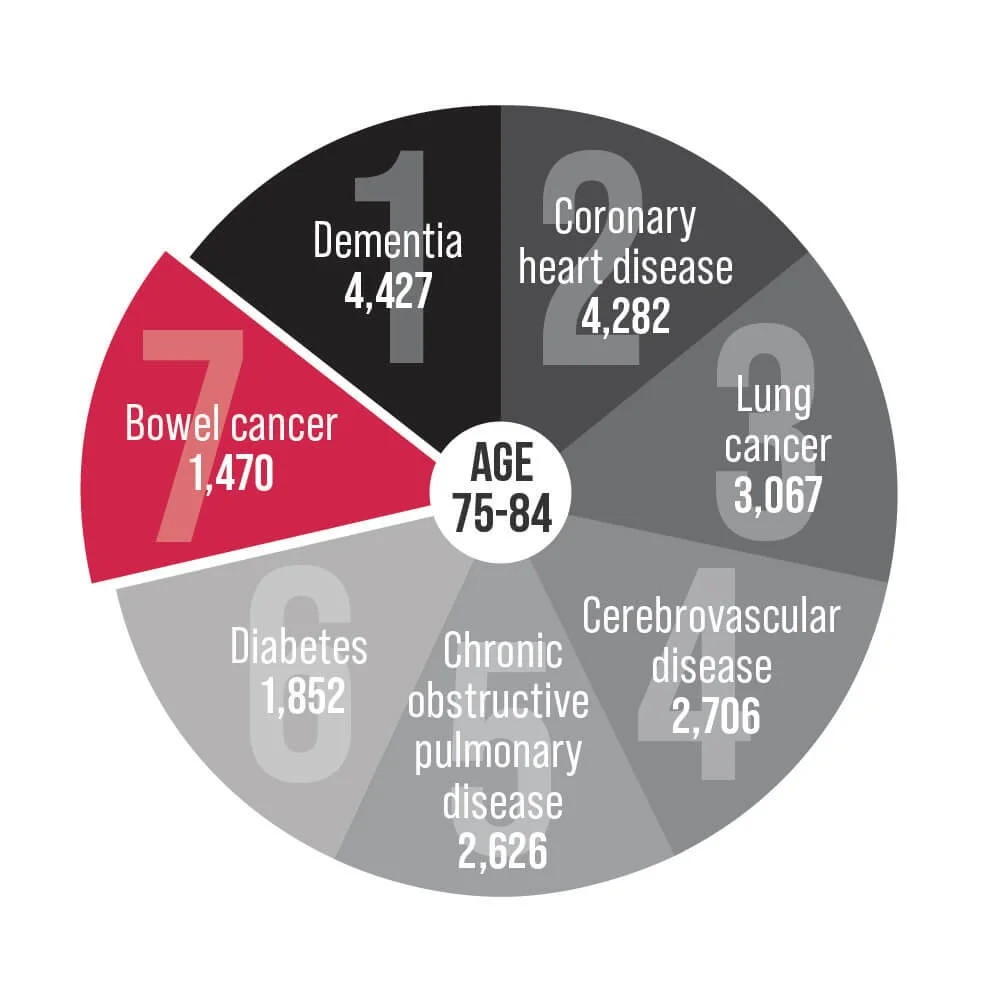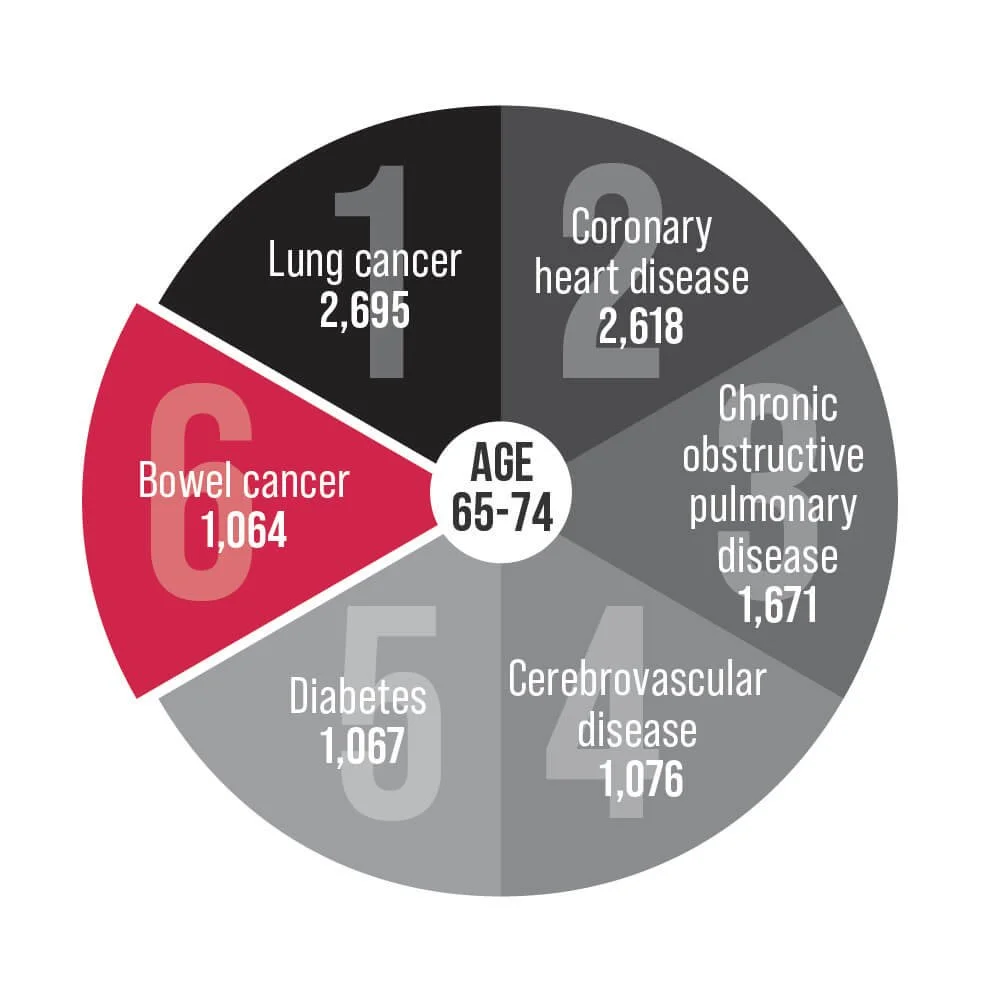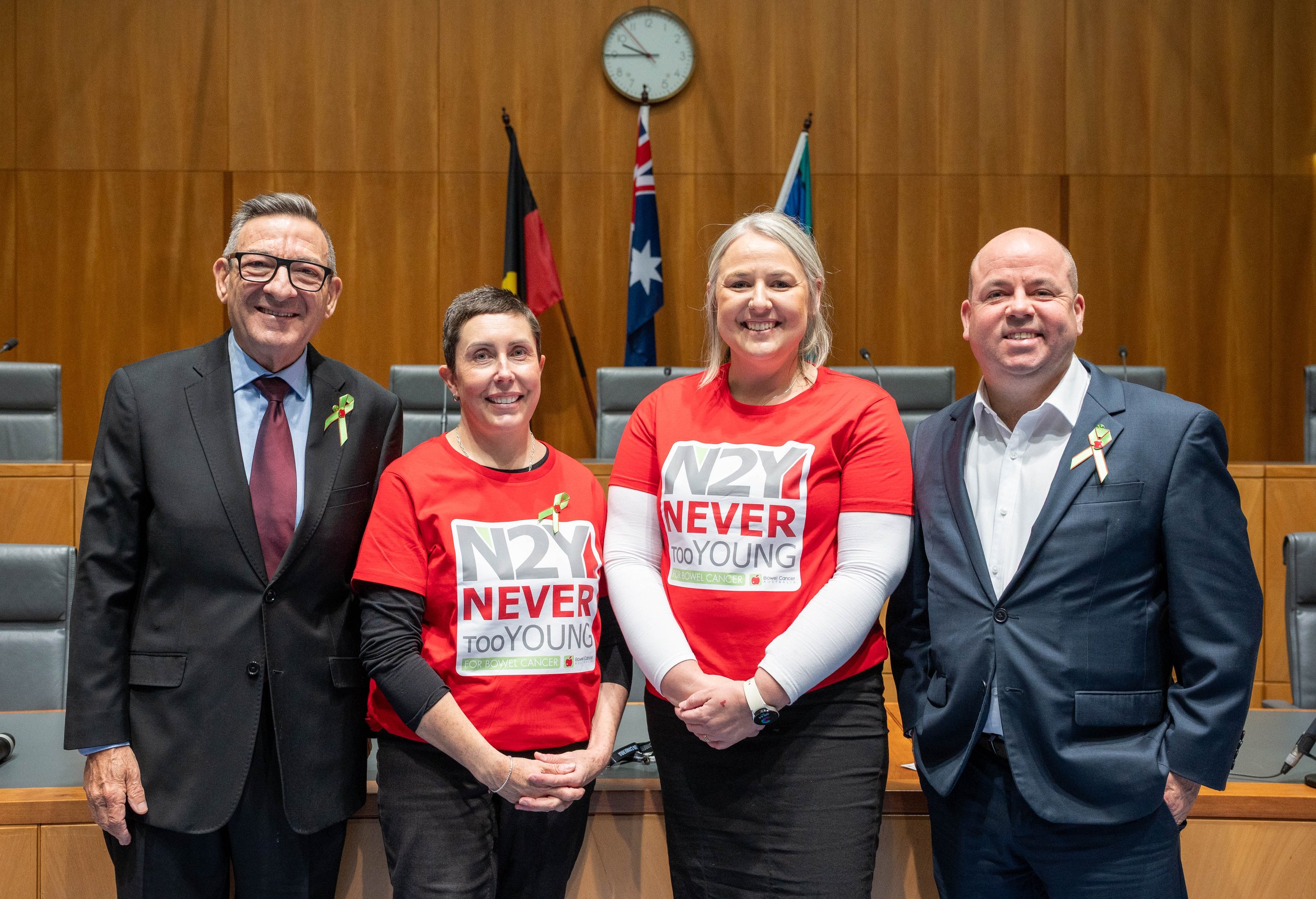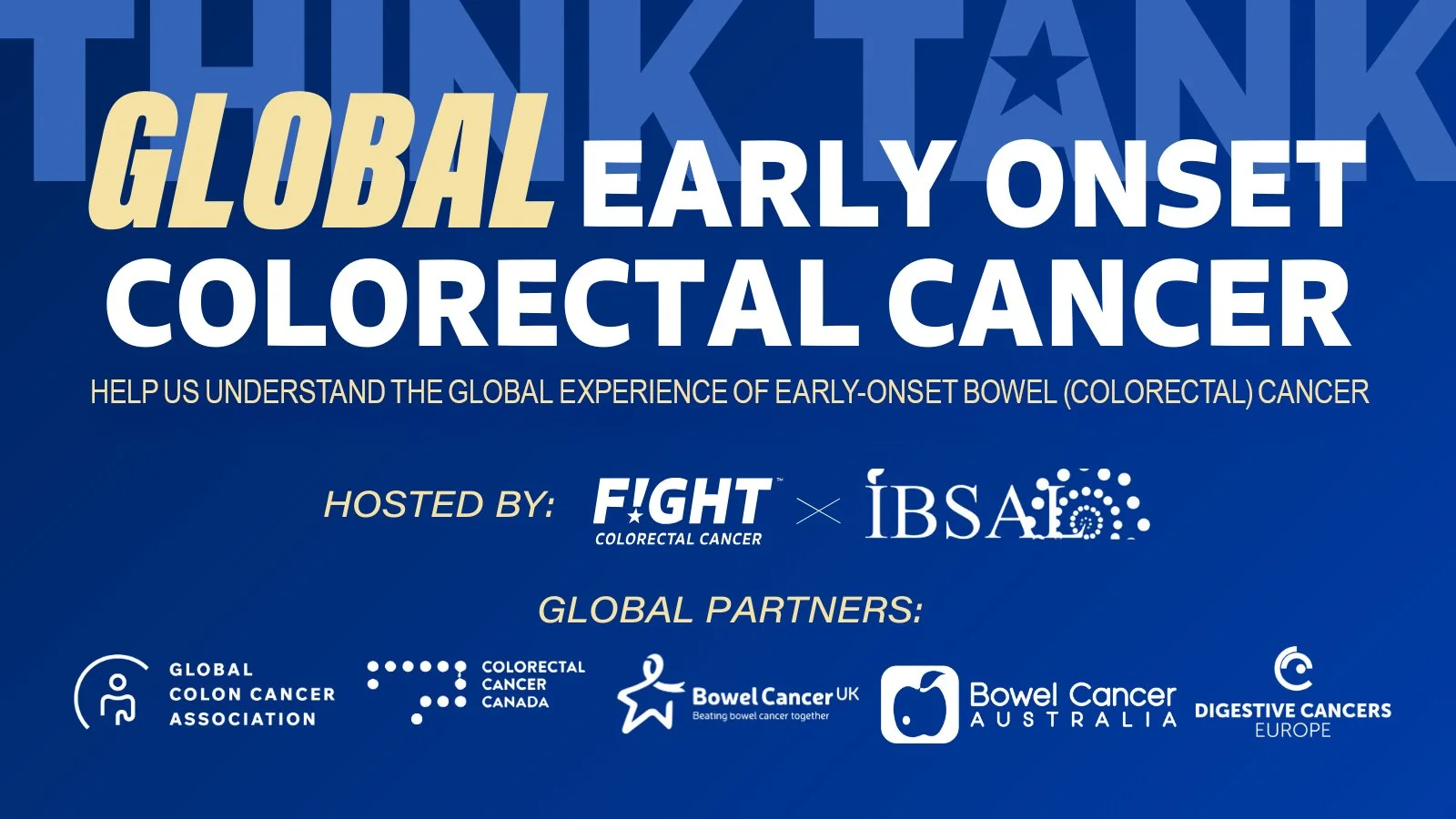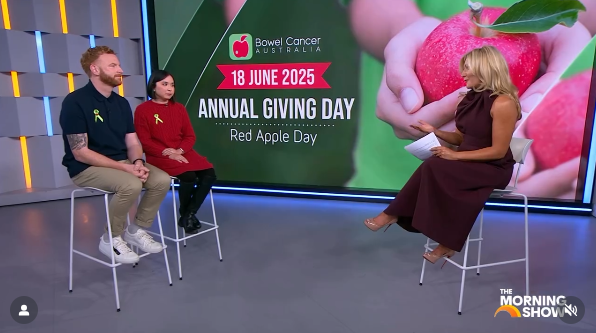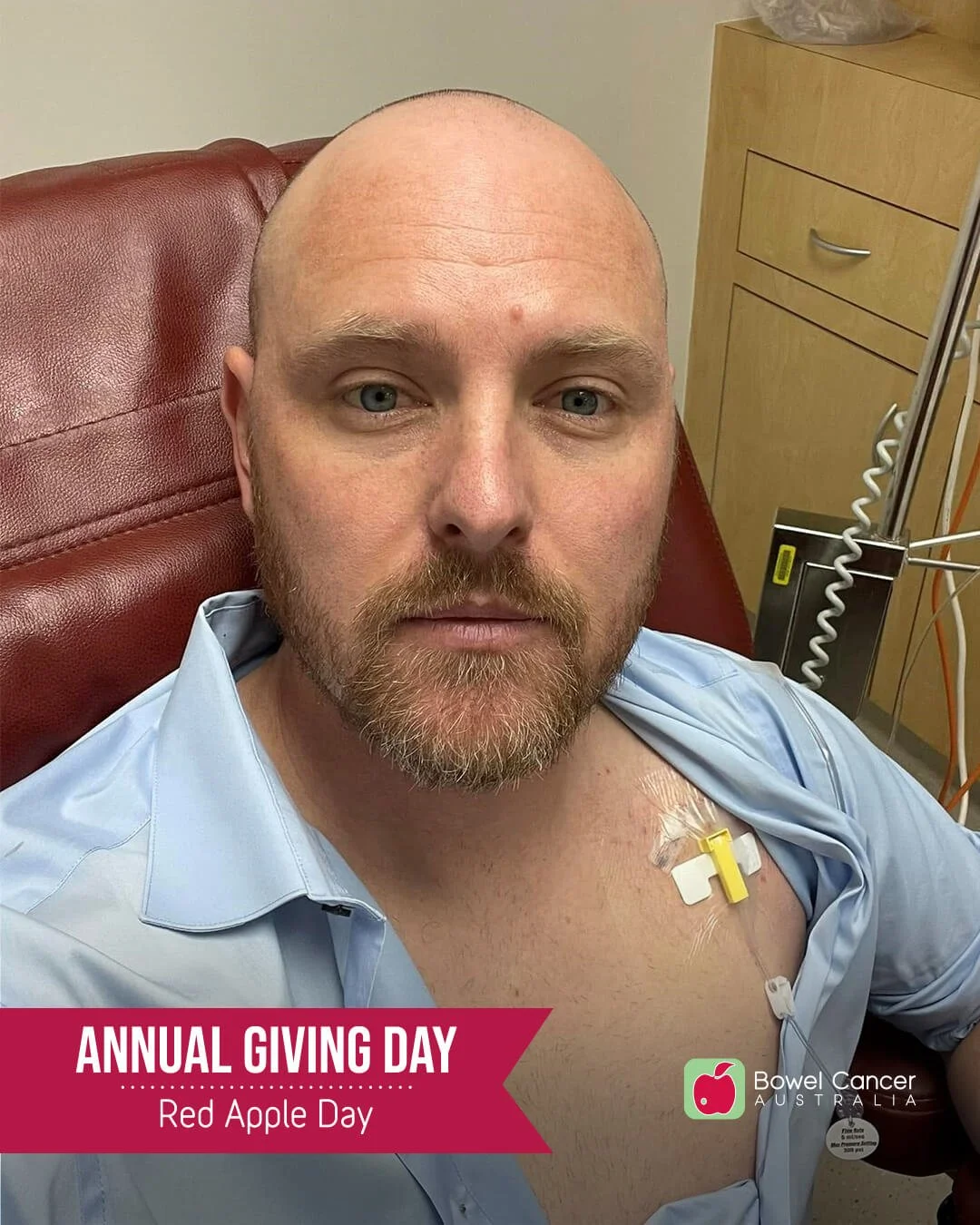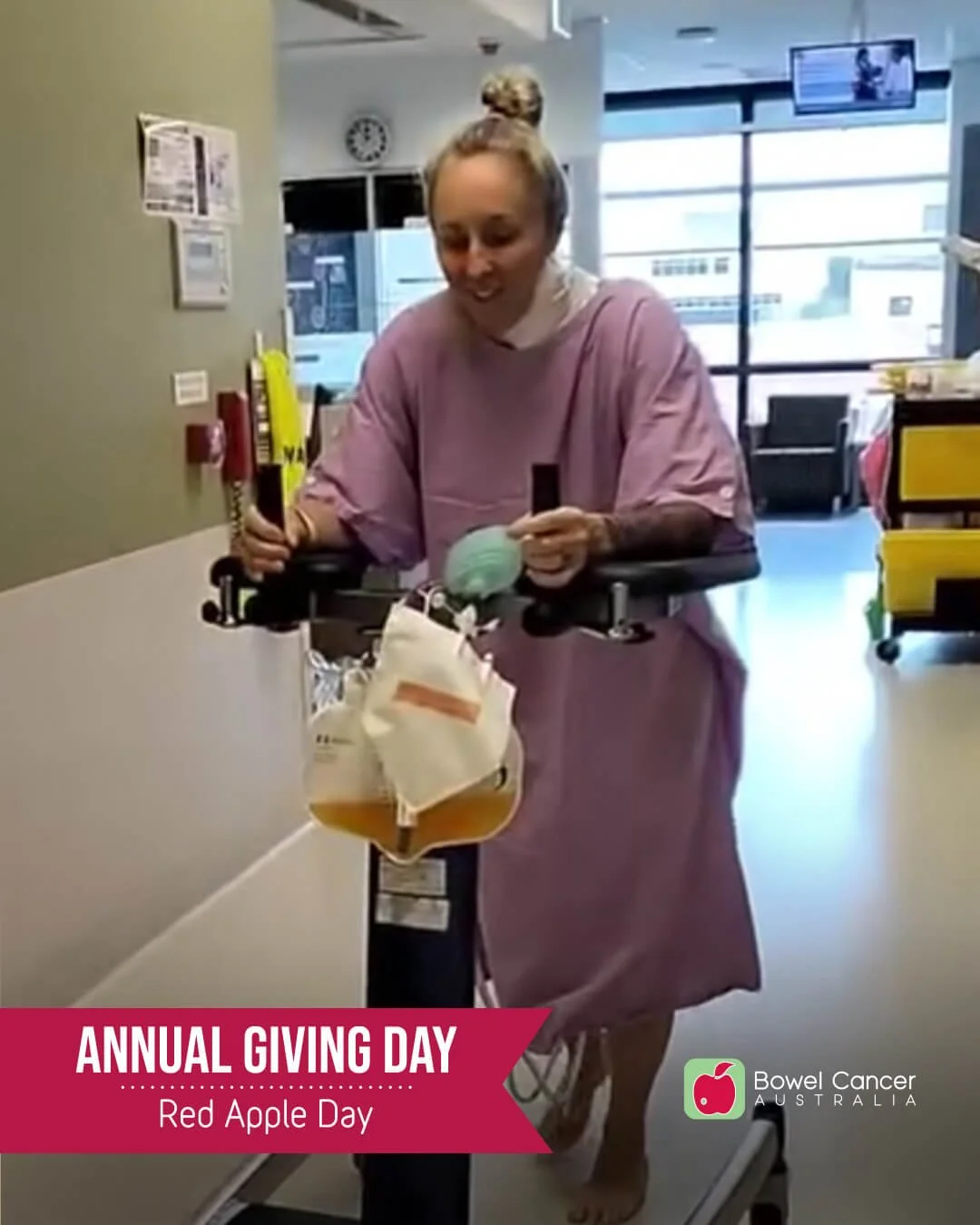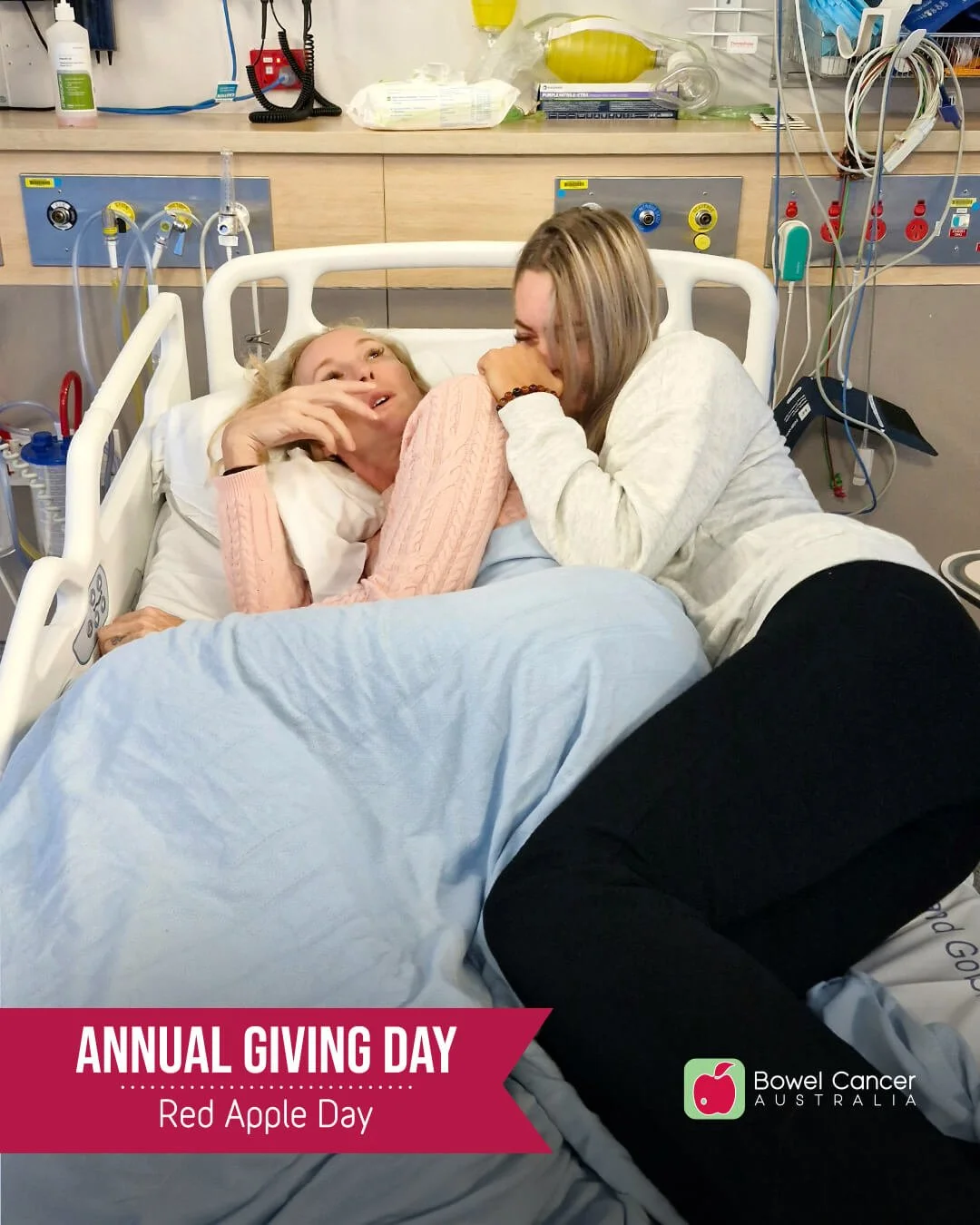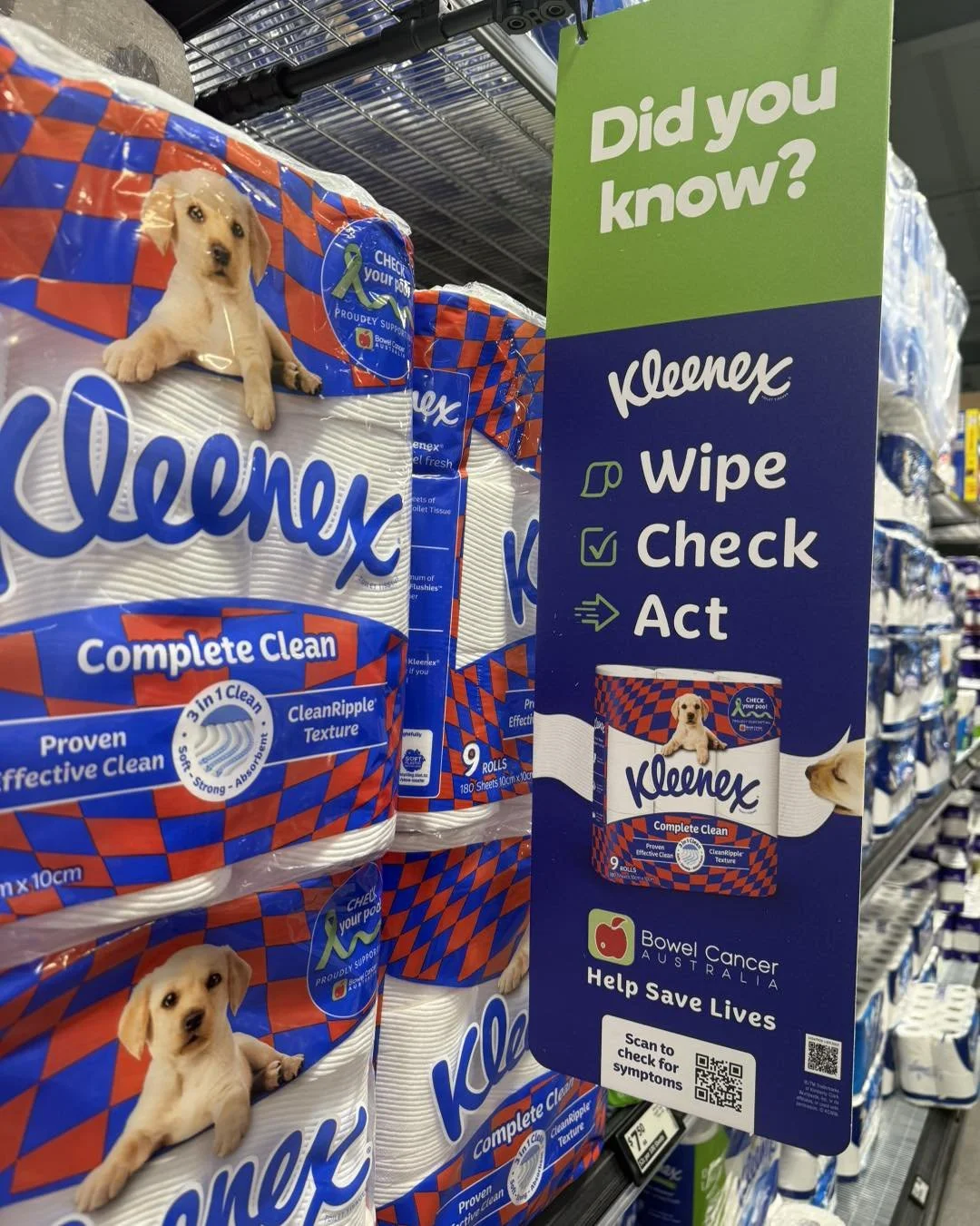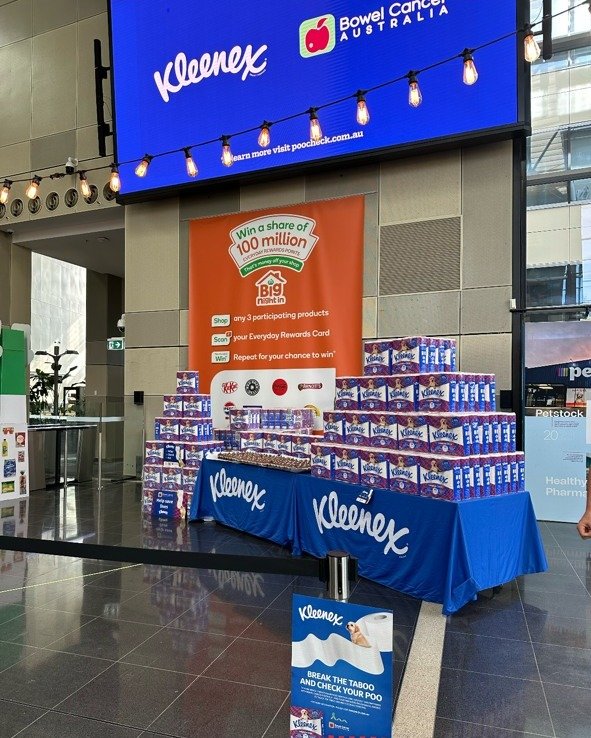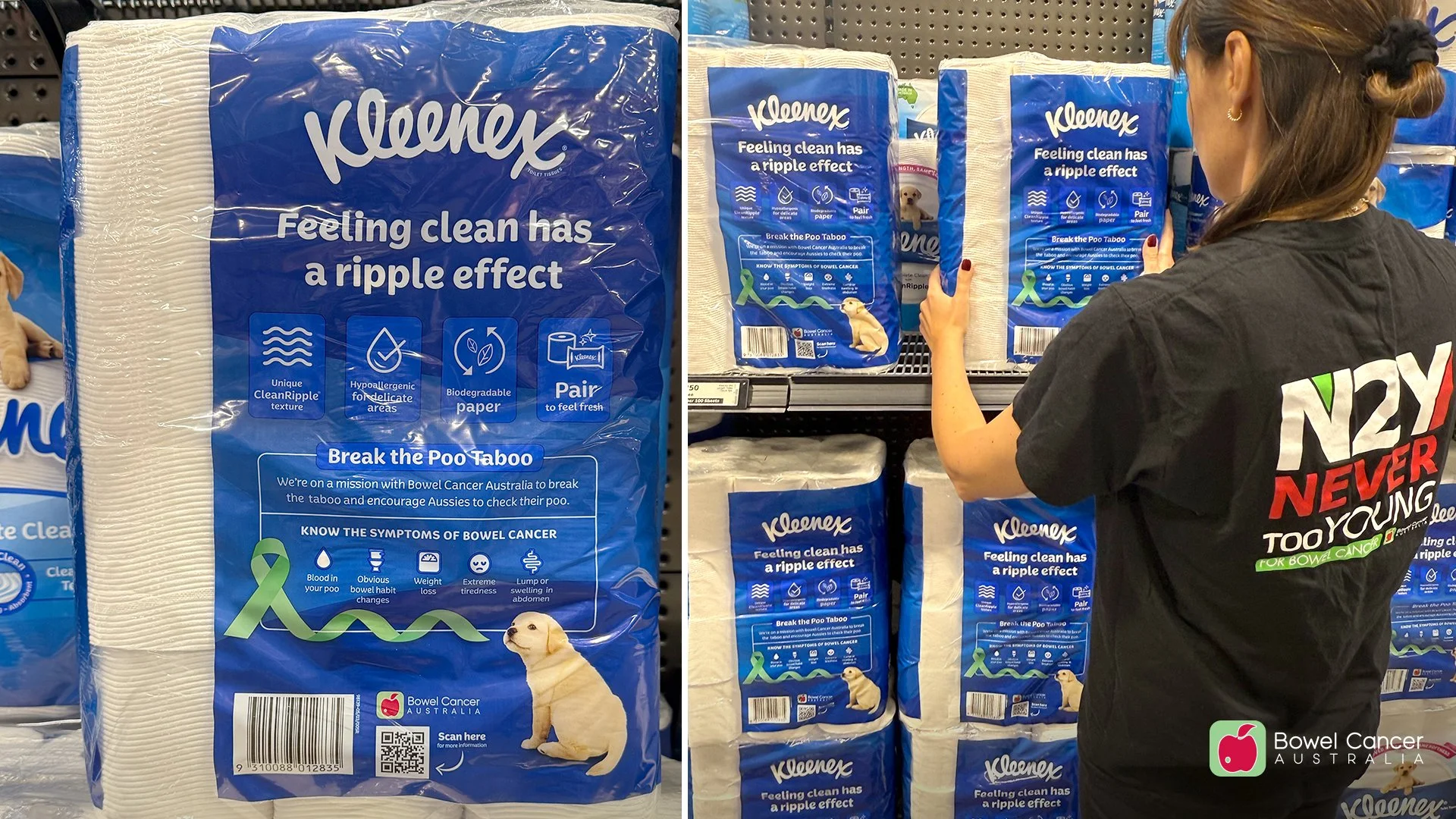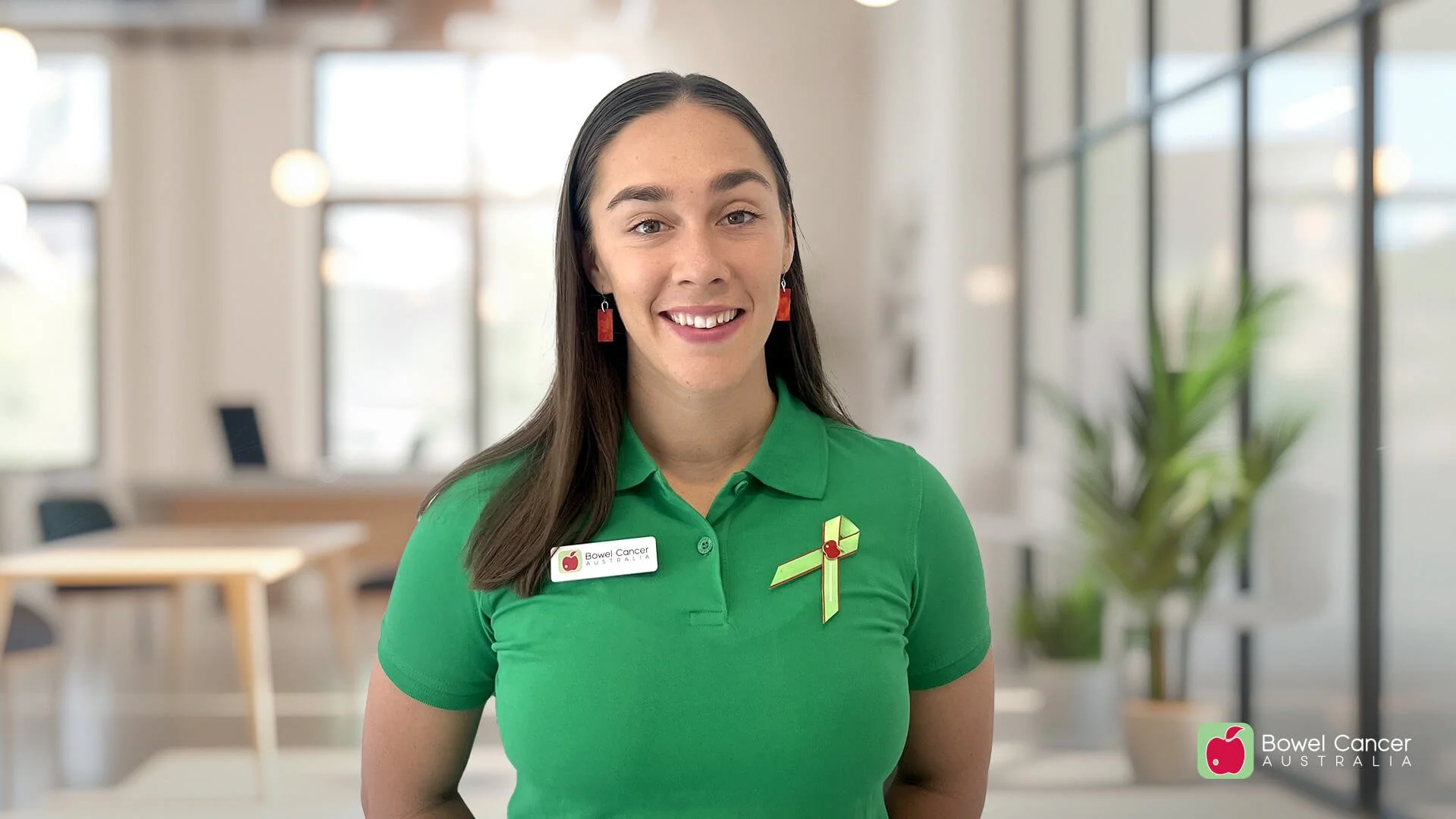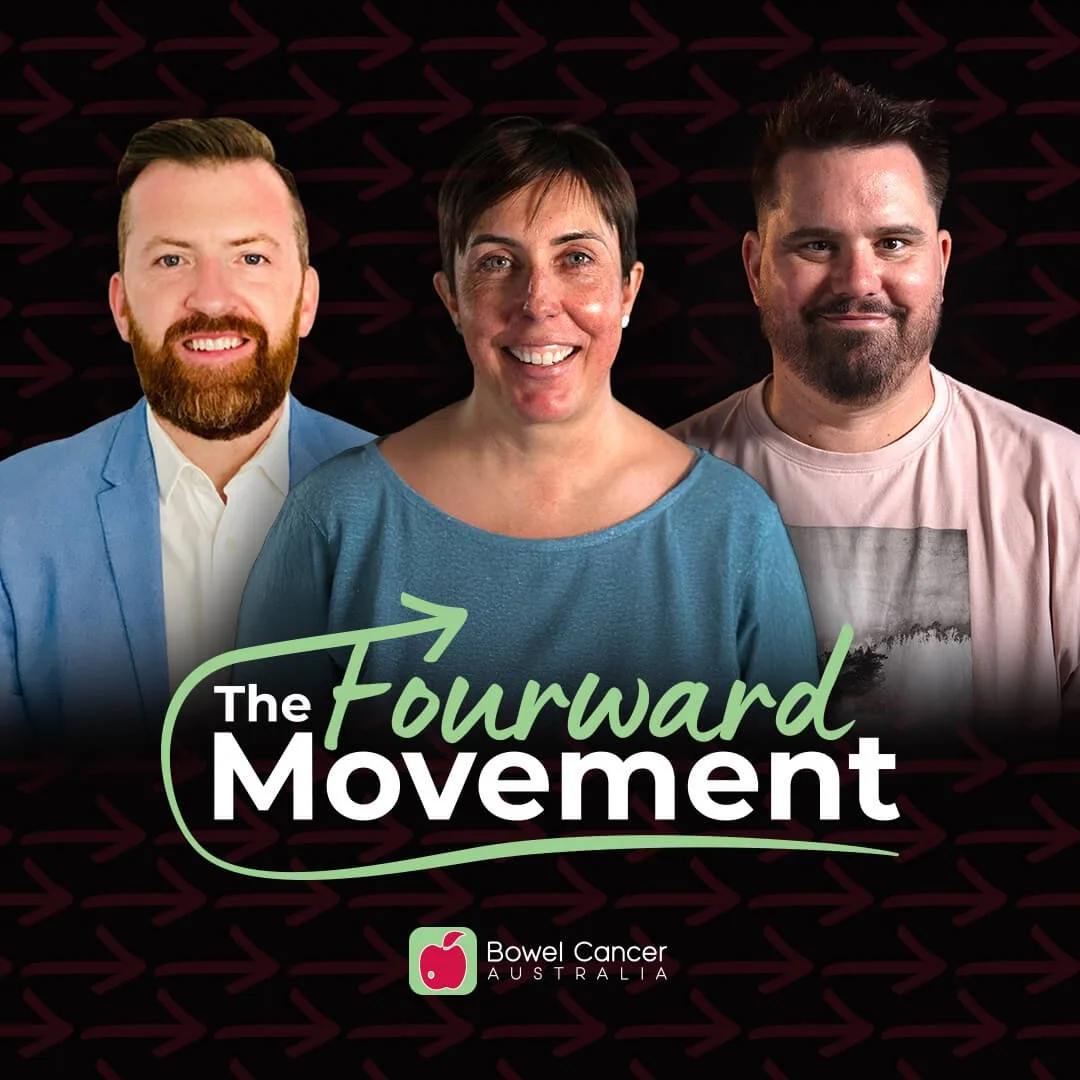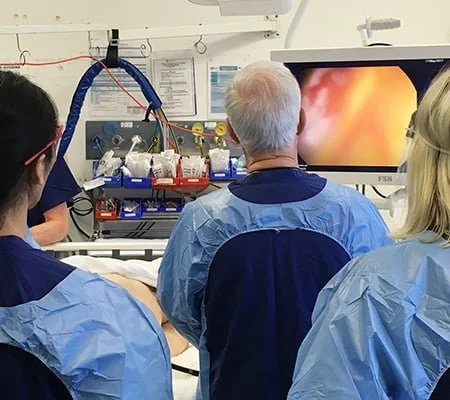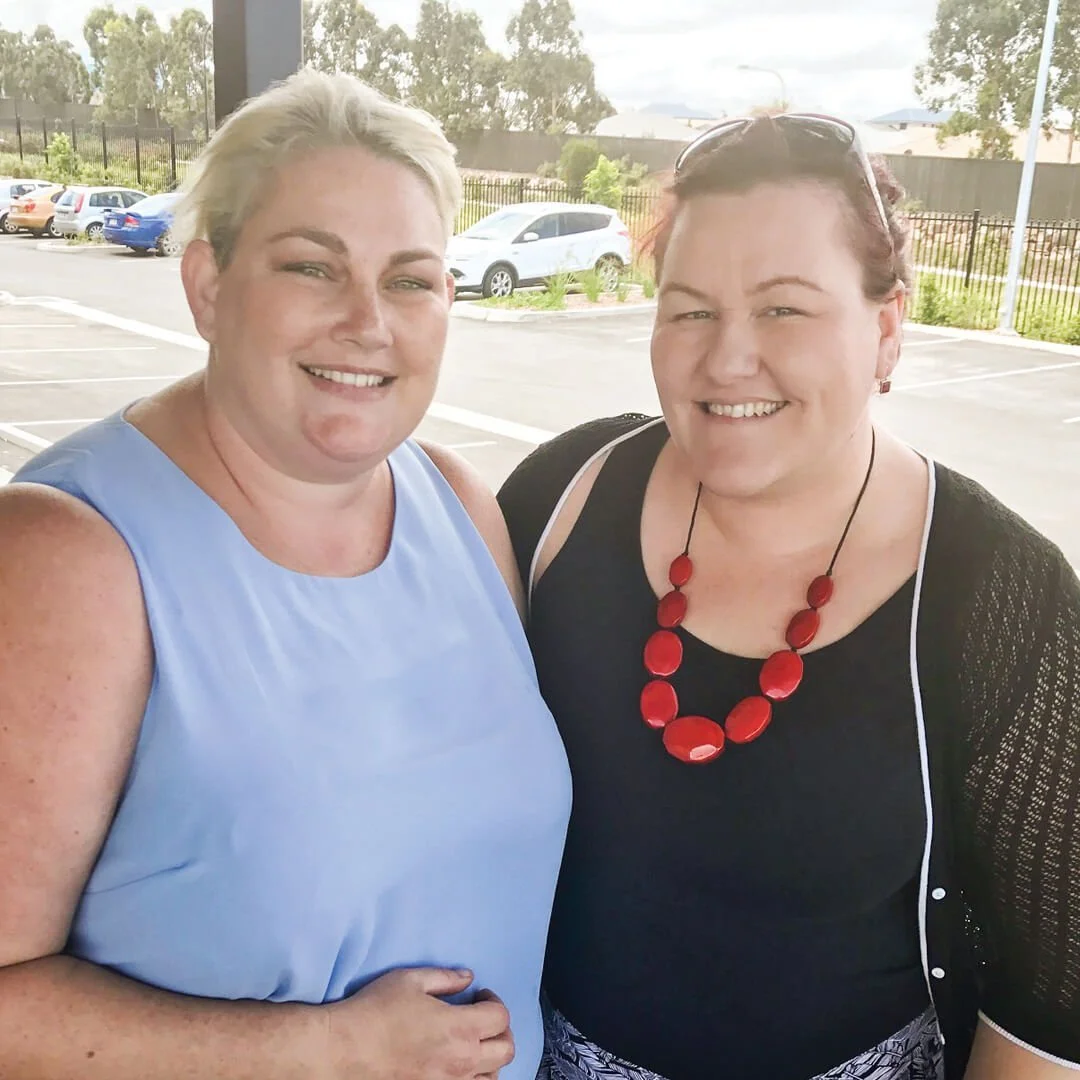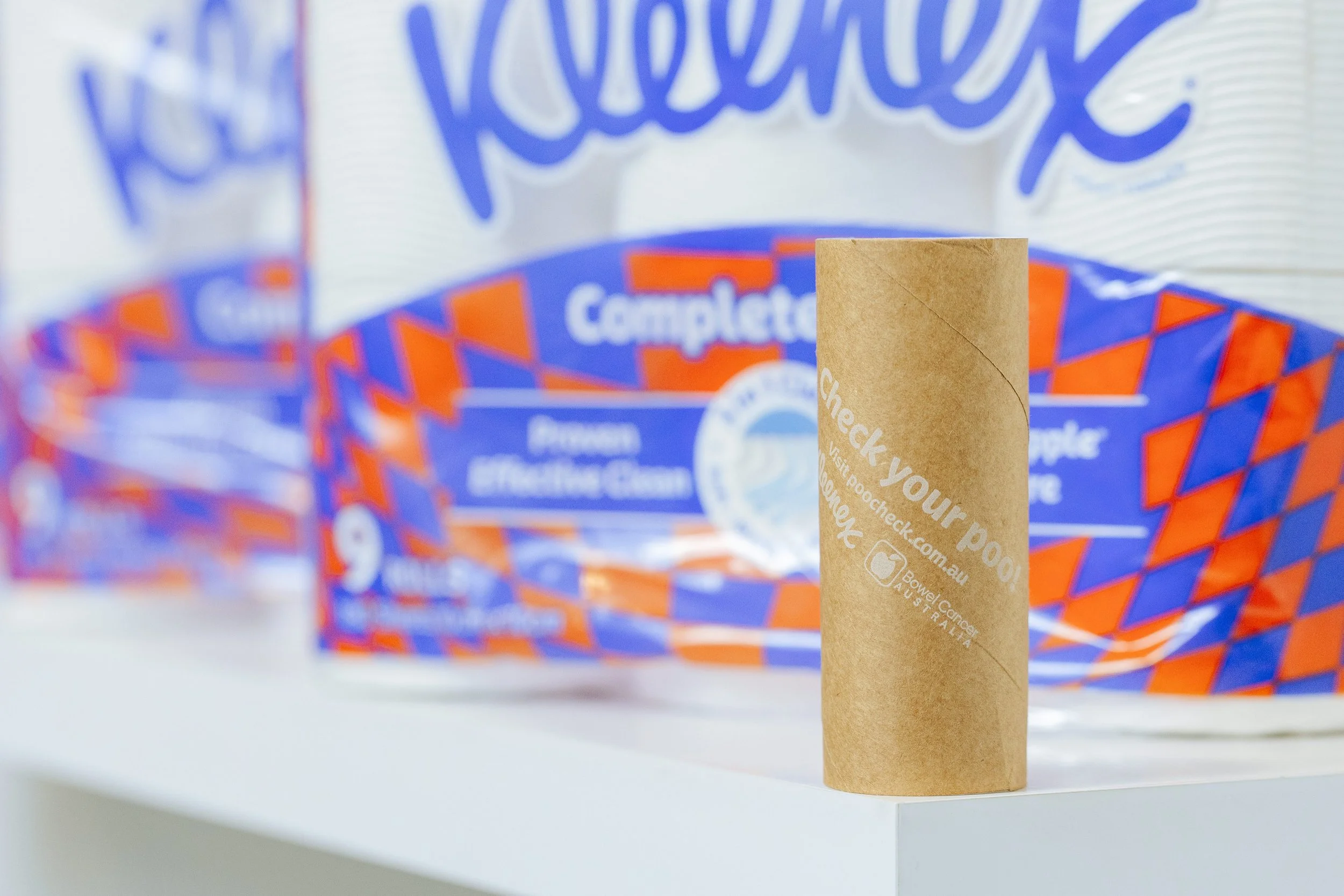
With your support we’re making an impact!
Bowel Cancer Australia is dedicated to championing what matters most to people impacted by bowel cancer and empowering everyone affected to live their best life.
In 2025, we made significant progress in re-writing the future of bowel cancer, Australia's second deadliest cancer, thanks to the commitment and dedication of our supporters, fundraisers, advocates, and partners.
We refused to accept the status quo as we sought to ensure no Australian faces a diagnosis of bowel cancer alone.
Awareness of both bowel cancer and early-onset bowel cancer continued to grow. Our national advocacy efforts gained momentum, research advanced, and support services expanded to reduce inequities in the care of those navigating the disease.
A year on from its launch, Parliamentary Friends of Bowel Cancer established itself as a vital non-partisan voice in Federal Parliament. Co-chaired by Steve Georganas MP and Mr Sam Birrell MP, the forum continues to drive greater awareness, policy action, and support for Australians affected by bowel cancer.
This momentum was reinforced by our annual pre-eminent advocacy event, Call on Canberra, where advocates shared their lived experiences and urged policymakers to address the age bias and expand research funding into the causes of rising rates of early-onset bowel cancer.
Advocates highlighted the urgent need for colonoscopy referrals for younger people with red flag symptoms and the development of age-appropriate clinical practice guidelines.
We continued to promote and drive participation in our Never2Young Continual Professional Development (CPD) series, which provides GPs accredited training to improve early diagnosis for younger patients. This is an important series as young Australians often face significant delayed recognition of red flag signs and symptoms.
Bowel Cancer Australia also joined global experts, advocates, and researchers in Barcelona for the first-ever Global Think Tank on early-onset bowel cancer. The event united 18 countries to address the rapid rise in cases among people under 50 and to develop a coordinated research strategy.
2025 marked the seventh anniversary of Professor Mark Molloy’s appointment as the Lawrence Penn Chair of Bowel Cancer Research with significant progress being made in our understanding of how bowel cancers grow.
We were pleased to offer a $3 million grant over five years for an Early-Onset Bowel Cancer Centre of Research Excellence. The Centre will be a focal point of expertise that fosters and facilitates national collaborative research endeavours focused on the cause (aetiology) of the increase in early-onset bowel cancer.
Bowel Cancer Australia is excited to be collaborating with the National Health and Medical Research Council (NHMRC) through the Centres of Research Excellence (CRE) scheme to improve health outcomes and promote or improve translation of research outcomes into policy and/or practice for early-onset bowel cancer.
Our Patron, Richard Penn AM and Medical Director Graham Newstead AO were both acknowledged in the King's Birthday Honours. Richard was acknowledged for significant service to the community through charitable initiatives, and Graham was acknowledged for distinguished service to colorectal surgical medicine and training, to bowel cancer awareness, education, and prevention, and to professional societies.
The passing of our colleague and friend, Penelope Morris AM, was a time of deep sadness. Penny was the longest-serving director, having been appointed in November 2006. We will be forever grateful for her service and generosity.
Our collaboration with Kleenex® continued to break the “poo taboo,” with bespoke packaging and messaging on loo rolls that encouraged Aussies to check their poo for signs of bowel cancer.
This campaign’s impact was recognised through the winning of gold and silver awards at the Communication and Public Relations Australia (CPRA) Golden Target Awards, a powerful acknowledgement of the collaborative awareness campaigns we are driving across Australia.
Throughout the year we expanded our Specialist Bowel Care Nurse program with the placement of another eight dedicated nurses in key locations across Australia.
An exercise physiologist and additional nutritionists and nurses joined our specialist telehealth support service, providing advice tailored to the unique needs of people impacted by bowel cancer throughout the country.
Through every milestone, every breakthrough, and every powerful lived experience shared, 2025 was a year of undeniable progress.
But our work is far from over and we continue to invest our resources strategically in high-impact areas of unmet need.
One of those areas is early-onset bowel cancer. Rates are rising and young Australians are being diagnosed with more advanced and aggressive disease. They encounter psychosocial and fertility challenges and confront the risk of premature morbidity and death, as well as have specific and often unmet needs.
While most early-onset bowel cancer cases are sporadic, the underlying cause and risk factors are not fully understood, necessitating the need for greater awareness, prompt diagnosis, tailored support, and further research.
Thank you for your support.
Craig M Jackson, Chairman
Julien Wiggins, CEO

Timeline of events & our achievements
Bowel Cancer Australia is the trusted national voice on bowel cancer, championing what matters most to people affected by bowel cancer.
Our financial independence affords us the freedom to be a dissenting voice as required and has enabled us to invest in priorities that lead to meaningful change, influence public policy, engage more people in life-saving conversations, focus support on patients’ needs, and fund vital research.
Click here to view the timeline of events and our achievements.
A decade of impact

Our strong, clear, and purposeful vision and mission; engagement of stakeholders through innovative and unique marketing initiatives; impactful collaborations that drive organisational purpose; and design of solutions based on system-level change were all cited as reasons why we were chosen as the inaugural recipient.
We were also recognised as the NGO of the Year for excellence in commitment and success in a health-focused mission (Australia Doctor Group PRIME 2017); honoured for Excellence in Patient/Customer Support following the release of the bowel cancer app (PRIME 2016); and received the Corporate Social Responsibility Award for the My Cancer, My Voice campaign (PRIME 2014).
In addition, our dynamic campaigns that raise awareness, challenge perceptions, and motivate action have been consistently recognised by the commercial advertising industry, including PRIA National Golden Target Awards, ADMA Creativity & Effectiveness Awards (AC&E), and the Siren Awards.
Awards
In 2022, Bowel Cancer Australia’s Medical Director, A/Prof Graham Newstead AM, was awarded an Honorary Fellowship of the American College of Surgeons (ACS).
Individuals selected for Honorary Fellowship generally practice outside of the United States, possess an international reputation in the field of surgery or medicine, and have provided distinguished humanitarian service in the field of medical science.
In 2025, ‘The Life-Changing Loo Roll’ was awarded gold (consumer campaign) and silver (health campaign - consumer) at the Communication Public Relations Australia (CPRA) Golden Target Awards and named a finalist at the B&T Awards for Best Consumer PR Campaign and Best Retail Media Campaign.
The groundbreaking work of Bowel Cancer Australia’s ambassadors and advocates is highly regarded.
Turning science and statistics into something people can understand and care about, Advocate Stephanie Kaye (2014), Ambassador Erin Molan (2015), Spokesperson Amanda Richardson (2015), and Advocate Stephanie Bansemer-Brown (2021) have all been honoured by the Colorectal Surgical Society of Australia and New Zealand (CSSANZ) and commended for their contributions.
Bowel Cancer Australia was awarded Best Small Charity of the Year 2019 at the Third Sector Awards in recognition of our contribution to the third sector in a meaningful and impactful way that produces measurable benefits.
Bowel cancer is a
leading cause of underlying death for Australians aged 25-84
Over the past 20 years, bowel cancer incidence rates have decreased more than any other cancer
The most significant decreases of bowel cancer incidence rates this century coincided with the introduction of the National Bowel Cancer Screening Program. Bowel Cancer Australia continues to monitor colonoscopy waitlists on the impact of diagnosing Australia’s second deadliest cancer.
However, bowel cancer incidence and
mortality is rising in the under 50s
Despite the increase in the incidence of early-onset bowel cancer, defined as that occurring in people under the age of 50, the factors causing this increase are not clear. Around 13% of bowel cancer cases are diagnosed in people under 50 years of age.
Bowel cancer is now estimated to be the leading cause of cancer death among men aged under 50 and the second leading cause of cancer death in women aged under 50.
Help make real change happen!
There are many ways you can get involved and help create meaningful change.
Learn how at bowelcanceraustralia.org
What did we do? Year in Review
We challenged perceptions, raised awareness, and motivated action through dynamic campaigns.

Call On Canberra: Advocating for change
On September 1, Bowel Cancer Australia hosted its annual Call on Canberra for a third consecutive year as advocates from around the country visited Parliament House to raise awareness of early-onset bowel cancer and push for critical policy change.
Throughout the day, advocates met with MPs and Senators, sharing compelling lived experiences and calling for urgent policy priorities including:
Investment in primary care to raise awareness of age bias and the need for urgent colonoscopy referral for younger people experiencing red flag signs and symptoms.
Development of age-appropriate clinical practice guidelines.
Increased research funding into the causes of rising rates of early-onset bowel cancer.
The Minister for Health and Ageing, the Hon Mark Butler MP, highlighted the growing rates of early-onset bowel cancer and acknowledged advocates and Bowel Cancer Australia’s #Never2Young initiative during Question Time.
Parliamentary Friends of Bowel Cancer
In 2024, Bowel Cancer Australia, alongside co-chairs Steve Georganas MP and the Hon Dr David Gillespie MP, launched the Parliamentary Friends of Bowel Cancer.
Since its establishment, this non-partisan forum has continued to raise awareness and drive action on one of Australia’s most
pressing health challenges.
Now in its second year, this united voice in Federal Parliament is
a crucial step toward improving outcomes and ensuring no Australian faces bowel cancer alone.
Following the retirement of Dr Gillespie and the 2025 Federal Election, Mr Sam Birrell MP joined Mr Steve Georganas MP as co-chair of the Parliamentary Friends of Bowel Cancer in the 48th Parliament.

Advocacy Network
Patients feel they have the 'wrong cancer' due to a lack of dedicated support services and low awareness of the disease.
Help shift public perceptions and shape healthcare policies that affect over 163,000 people living with or beyond bowel cancer at a state/territory and federal level.
If not you, then who?
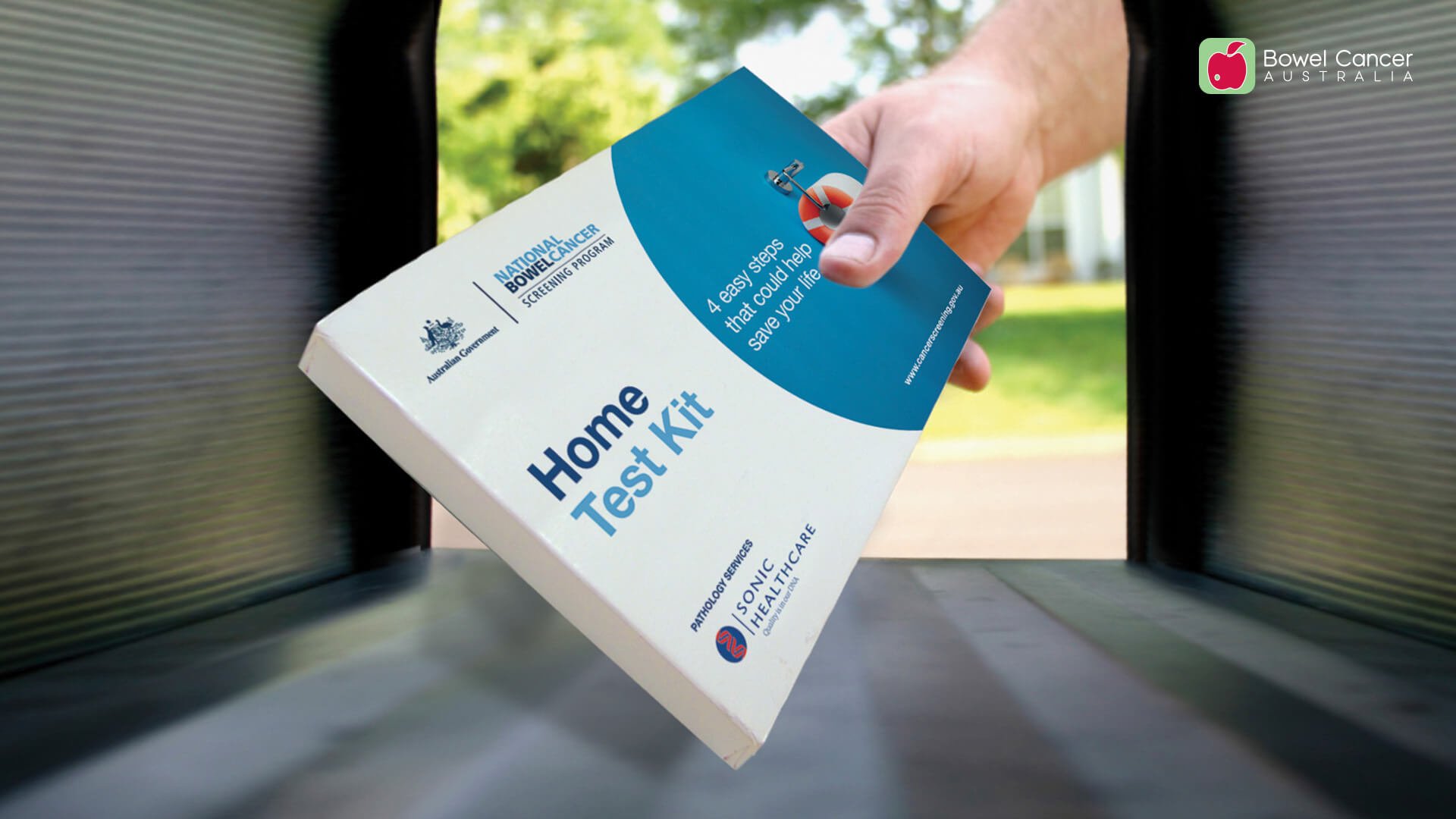
A breakthrough in bowel cancer screening
Following six years of consistent and dedicated advocacy, Bowel Cancer Australia achieved a major milestone on July 1, 2024, with the announcement that the National Bowel Cancer Screening Program (NBCSP) age would be officially lowered from 50 to 45 years of age.
Within the first six months of the lowered screening age, 77,551 tests had been requested by eligible people aged 45-49.
In the Australian Government's 2024–25 Mid-Year Economic and Fiscal Outlook (MYEFO), $21.7 million was allocated to support and expand the National Bowel Cancer Screening Program for Australians aged between 45 and 49 years old.

Colonoscopy wait-times
We continue to advocate for colonoscopy within 30 days from the first healthcare presentation for people experiencing bowel cancer symptoms or a positive screen, because when detected early, nearly 99% of bowel cancer cases can be successfully treated.
Wait times for those who received a NBCSP positive screen varied between 129 and 179 days depending on where participants lived.
Only 13.9% of participants with a positive screen received their colonoscopy within the recommended 30 days.

BowelScreen Australia
providing Australians ineligible to participate in the National Bowel Cancer Screening Program, the opportunity to screen.
Click here to purchase a bowel cancer screening test.
The ‘Patient Access Gap’
The Patient Access Gap refers to the time in days patients must wait between the date a medicine is authorised for use in Australia (TGA approved/ARTG listed) and the date that it is listed on the PBS and affordably available.
Bowel cancer patients have experienced some of the longest waits, with one life-extending medication taking more than six years and a record eight submissions before being listed on the PBS as a subsidised treatment.
Cancer treatment is time sensitive, and many patients don’t have time to wait.
Bowel Cancer Australia advocates for immediate affordable access following Therapeutic Goods Administration (TGA) approval of a medicine, so patients can benefit from life-saving and life-extending treatments sooner, while the Pharmaceutical Benefits Advisory Committee (PBAC) processes and price negotiations continue.
We continue horizon scanning for new treatment options approved overseas, advocating for them to be indicated and subsidised for patients in Australia.
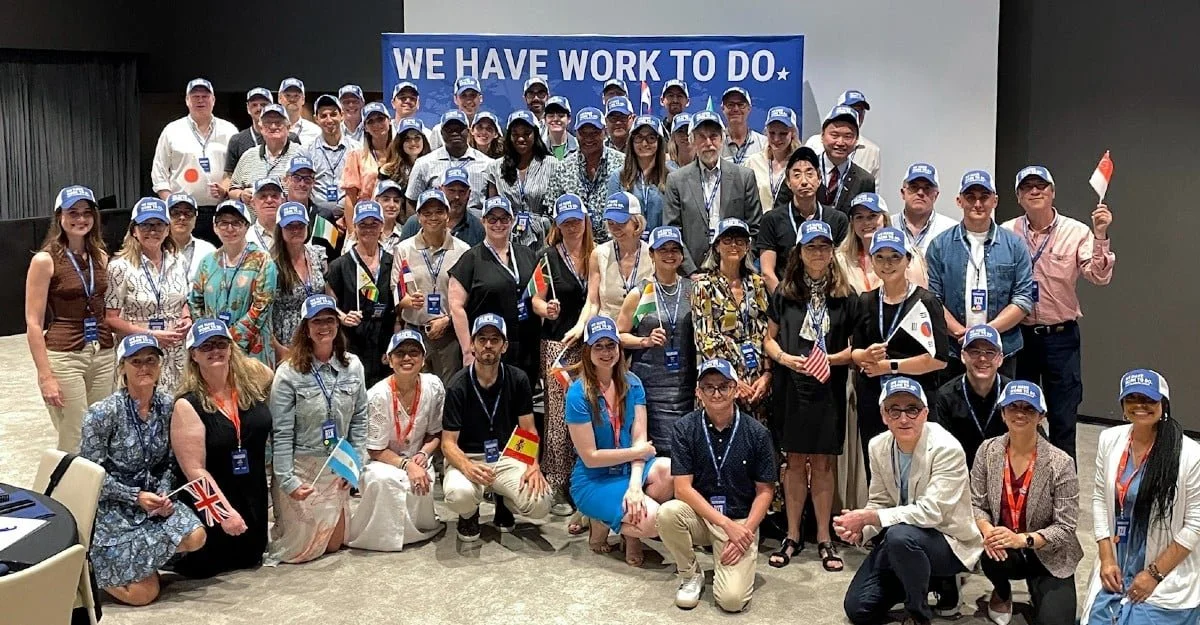
The 2025 Summary Report highlights the most pressing concerns and commitments identified at the Global Think Tank, including:
Rising rates of early-onset bowel cancer across multiple countries, even as overall bowel cancer rates decline.
Survey results from 500 patients in 21 countries, revealing the life-changing impact of early-onset bowel cancer on work, study, and family.
Only 15 per cent knew before diagnosis that bowel cancer could happen before 50.
Consistent evidence that young people are being diagnosed later and with a more aggressive disease.
Agreement among experts that awareness and education must be prioritised to improve early detection.
To address these, five global workgroups were established, focusing on research, data, biobanking, advocacy, and awareness to drive progress over the next two years.
Their findings confirm early-onset bowel cancer is a true global health crisis requiring urgent and united action.
In June, Bowel Cancer Australia took part in the first-ever Global Think Tank on Early-Onset Colorectal Cancer in Barcelona, joining 71 experts, advocates, researchers, and survivors from 18 countries to address the alarming rise in cases among people under 50.
The landmark event brought together a coalition of advocacy organisations, including Bowel Cancer UK, Colorectal Cancer Canada, Digestive Cancers Europe, and the Global Colon Cancer Association, to begin developing a unified global research strategy focused on prevention, earlier diagnosis, and improved treatment for younger patients.
Awareness with impact
Australia's Deadliest:
Bowel cancer campaign continued challenging perceptions.
The campaign coincided with an early release of findings from a study conducted by University of Melbourne researchers which examined bowel cancer rates among those aged 20 to 49 (‘early-onset’) across a thirty-year period (1990-2020).
It found rising early-onset colon cancer rates resulted in 2,398 excess cases, or a 26% increase in observed cases compared to expected numbers if the increase did not occur. Similarly, rising early-onset rectal cancer rates resulted in 1,949 excess cases or a 20% increase.
Author Professor Mark Jenkins, University of Melbourne said, “Our inability to halt the rising burden of early-onset bowel cancer over the last thirty-years has resulted in over 4,300 excess cases being diagnosed among young Australians.”
Bowel Cancer Australia’s bold awareness campaign, Australia’s Deadliest, continued for a second year, challenging perceptions and sparking urgent conversations about early-onset bowel cancer.
Four courageous advocates – Nina, Jake, Rachel and Kin featured in the campaign, whose powerful testimonies, combined with bold headlines and compelling visuals, served as a wake-up call to Australians of all ages: recognise the red flag signs and symptoms, act early and take bowel cancer seriously.
Bowel Cancer Australia was mentioned in over 388 news stories, reaching more than 10.8 million people, during our signature awareness and fundraising event, Bowel Cancer Awareness Month, in June.

Our Annual Giving Day - Red Apple Day
June 18 was Red Apple Day and Australians showed their support by raising more than $306,894, the largest amount ever raised on Bowel Cancer Australia’s Annual Giving Day.
Funds raised will have a direct impact, enabling Bowel Cancer Australia to support promising, high-impact research into early-onset bowel cancer.
This research will help improve understanding of the disease, including its causes, pathways to earlier diagnosis, improved models of care, emerging treatment options, and tailored support for younger patients.
Special thanks to our generous Matching Partners and to all our passionate Annual Giving Day Champions and Fundraisers.
Bowel Cancer Australia's apple logo is symbolic of the charity's bowel cancer message: that 99% of bowel cancer cases can be treated successfully if found early.
The outline of Bowel Cancer Australia's apple logo appears as an abstract of a human bowel. The small hole in the apple is caused by a worm. If detected early and removed, the worm is unable to continue affecting the apple or the health of the tree.
It's the same with people. If bowel cancer is detected early, it can be successfully treated in almost 99% of cases, which means patients and their families can continue to enjoy a healthy life.
Breaking the poo taboo
Kleenex® continued its partnership with Bowel Cancer Australia to break the poo taboo.
Building on our groundbreaking partnership with Kleenex® AUNZ to challenge the poo taboo, bowel cancer symptom messaging began rolling out nationally on Kleenex Complete Clean and Kleenex Luxury Quilts Toilet Paper from January 2025.
This was supported by in-store activations to spark awareness and discussion.
In the privacy of their bathrooms, Aussies were reminded exactly what to look for – and what to do – if they spotted an irregularity.
The integrated campaign launched in May ahead of Bowel Cancer Awareness Month, using this timely hook to drive impact across influencer, social, PR, digital and retail channels.
A national PR blitz saw the loo rolls on every TV channel, major online news sites, radio, top podcasts, and Substacks.
‘The Life-Changing Loo Roll’ was awarded gold (consumer campaign) and silver (health campaign - consumer) at the Communication Public Relations Australia Golden Target Awards.
In June, the humble loo roll turned into a powerful awareness tool when limited edition Kleenex® toilet paper hit Woolworths shelves nationwide featuring a printed reminder to “Check your poo!” and visit poocheck.com.au, where Australians could access information on bowel cancer symptoms and the importance of early detection.

Collaboration.
We collaborated with peak bodies, patient/consumer and healthcare organisations as well as industry, nationally and internationally. The value of collective voice and shared commitment to patient-centred care helps amplify our efforts in championing what matters most to people affected by bowel cancer.
We provided practical and emotional support and built communities through shared, lived experiences.
Never2Young CPD series: Tackling age bias in early-onset bowel cancer
Throughout the conference, GPs heard from advocates with lived experience and learned how participating in the Never2Young series can help identify red flag signs and symptoms in younger people.
Building on this momentum, we extended the campaign by delivering apple boxes to 54 medical clinics across Southeast Queensland. Each apple box included an information pack about early-onset bowel cancer and the Never2Young CPD series.
By pairing something fresh and tangible with critical information on early-onset bowel cancer and the #Never2Young CPD Series, we built stronger awareness, recall and action among GPs.
In 2025 we continued to increase understanding of early-onset bowel cancer and overcome age bias through driving participation in the Never2Young CPD series.
In May, Bowel Cancer Australia advocates attended Melbourne’s General Practice Conference & Exhibition (GPCE).
The bold booth design, anchored by an eye-catching life-sized apple tree, captured the attention of GPs and medical professionals, drawing them in to connect with advocates and hear their stories. It provided an ideal opportunity to engage directly with GPs and share information about the education series.
Diagnosed with the ‘wrong cancer’
“I felt invisible. While other patients had access to nurse support,
I was left to deal with my disease alone.” ~ Steff
Closing the care gap:
8 new Bowel Care Nurses
Bowel Cancer Australia and Icon Cancer Centre continued to improve patient care by placing an additional five specialist Bowel Care Nurses in Auchenflower (QLD), Kurralta Park (SA), Midland (WA), North Lakes (QLD), and Townsville (QLD).
Additional specialist Bowel Care Nurses were also placed in Cairns (QLD), Dubbo (NSW) and Wahroonga (NSW), in collaboration with local hospitals.
This initiative delivers expert, in-person support where it’s needed most – closer to home.
More than just medical professionals, specialist Bowel Care Nurses are a lifeline – providing critical care coordination, emotional support, and expert guidance to help patients navigate the complexities of treatment.
Access to a specialist nurse by phone or in-person has been identified by more than eight in ten (83%) bowel cancer patients as an important resource to improve their care coordination.
Yet, fewer than one in three have a dedicated care coordinator.
Bowel Cancer Australia continues to bridge the care gap, ensuring more Australians receive the compassion, advocacy, and life-changing support they deserve.
Bowel Cancer Australia’s in-person specialist Bowel Care Nurse locations
Introducing our dedicated
Bowel Care Exercise Physiologist
Exercise plays an important role in bowel cancer prevention, treatment, recovery, and recurrence.
It can help reduce the number and severity of treatment-related side effects and symptoms such as pain, fatigue, sleep disturbances, cognitive impairment, mental health wellbeing, and low anterior resection syndrome (LARS), as well as improve or maintain function during and following treatment.
Observational studies have shown that being physically active (participating in 150+ minutes of moderate+ intensity) every week following a bowel cancer diagnosis is associated with reduced risk of recurrence and better overall survival.
Bowel Cancer Australia welcomed Kailey to our specialist telehealth support services team in 2025, who offers information and advice about exercise to help people manage bowel cancer treatment, recovery, and recurrence.
“Exercise is still an underutilised part of the cancer treatment process, and that needs to change. We know the idea of exercising can feel overwhelming, which is why we’re here to help you build a realistic routine that truly works for you.” ~ Kailey.
People living with or beyond bowel cancer and their loved ones can now access this new service anytime via our website or by calling Bowel Cancer Australia's free Helpline on 1800 727 336.
Providing Specialist Support Services
We empowered people with the tools and knowledge to be advocates for their own health and give real meaning to the term ‘patient-centred care’.
In 2025 we launched The Fourward Movement - a new addition to Bowel Cancer Australia’s suite of online support groups, which complements The Movement – Wellness Beyond Diagnosis and The Meaningful Movement.
The Fourward Movement has been created especially for individuals living with Stage IV bowel cancer, providing space for open, honest, and sensitive conversations about the unique challenges and experiences that come with this diagnosis.
The group is about living well, peer support, and building a community with others.
We are incredibly fortunate to have Nina and Jake as group moderators, along with David, the group’s expert session host, as all bring lived experience, compassion, and wisdom to the group.
While The Fourward Movement is tailored to the Stage IV experience, it is open to all bowel cancer patients and carers who feel it may be helpful to them or their loved one.
You’re welcome to join any of Bowel Cancer Australia’s online support groups. Each group has its own focus and separate registration process, which is accessible through the Bowel Cancer Australia website or Facebook.
Click here to join the Fourward Movement.
We invest in research that has the
potential to improve survival and
builds a path towards a cure.
In October, Bowel Cancer Australia was pleased to offer a $3 million grant over five years to establish an Early-Onset Bowel Cancer Centre of Research Excellence.
The purpose of funding an Early-Onset Bowel Cancer Centre of Research Excellence is to create a focal point of expertise that fosters and facilitates national collaborative research endeavours focused on the cause (aetiology) of the increase in early-onset bowel cancer.
Bowel Cancer Australia is excited to be collaborating with the National Health and Medical Research Council (NHMRC) through the Centres of Research Excellence (CRE) scheme to improve health outcomes and promote or improve translation of research outcomes into policy and/or practice for early-onset bowel cancer.
The Grant Opportunity closed in November 2025.
Cracking the code of early-onset bowel cancer: the search for 10 key biomarkers
Backed by a $573,833 grant from Bowel Cancer Australia through Cancer Australia, leading cancer researcher Professor Michael Samuel – from the Centre for Cancer Biology based at the University of South Australia and the Basil Hetzel Institute for Translational Health Research and his team have launched a three-year research project to uncover why younger people are increasingly affected and why a significant number of patients relapse after treatment.
To find answers, the research team is examining 10 key tumour-produced biomarkers that may help identify who is most at risk and which patients are likely to see their cancer return.
Over the past year, the team has completed essential groundwork to advance this biomarker investigation, with the goal of enabling earlier detection, more personalised treatment, fewer unnecessary therapies, and better long-term outcomes for patients.
“Some people are going through intense monitoring and therapy that they might not need, while others who opt out may end up facing a relapse that could have been prevented,” says Professor Samuel. “We need tools to predict, prevent, and personalise treatment.”
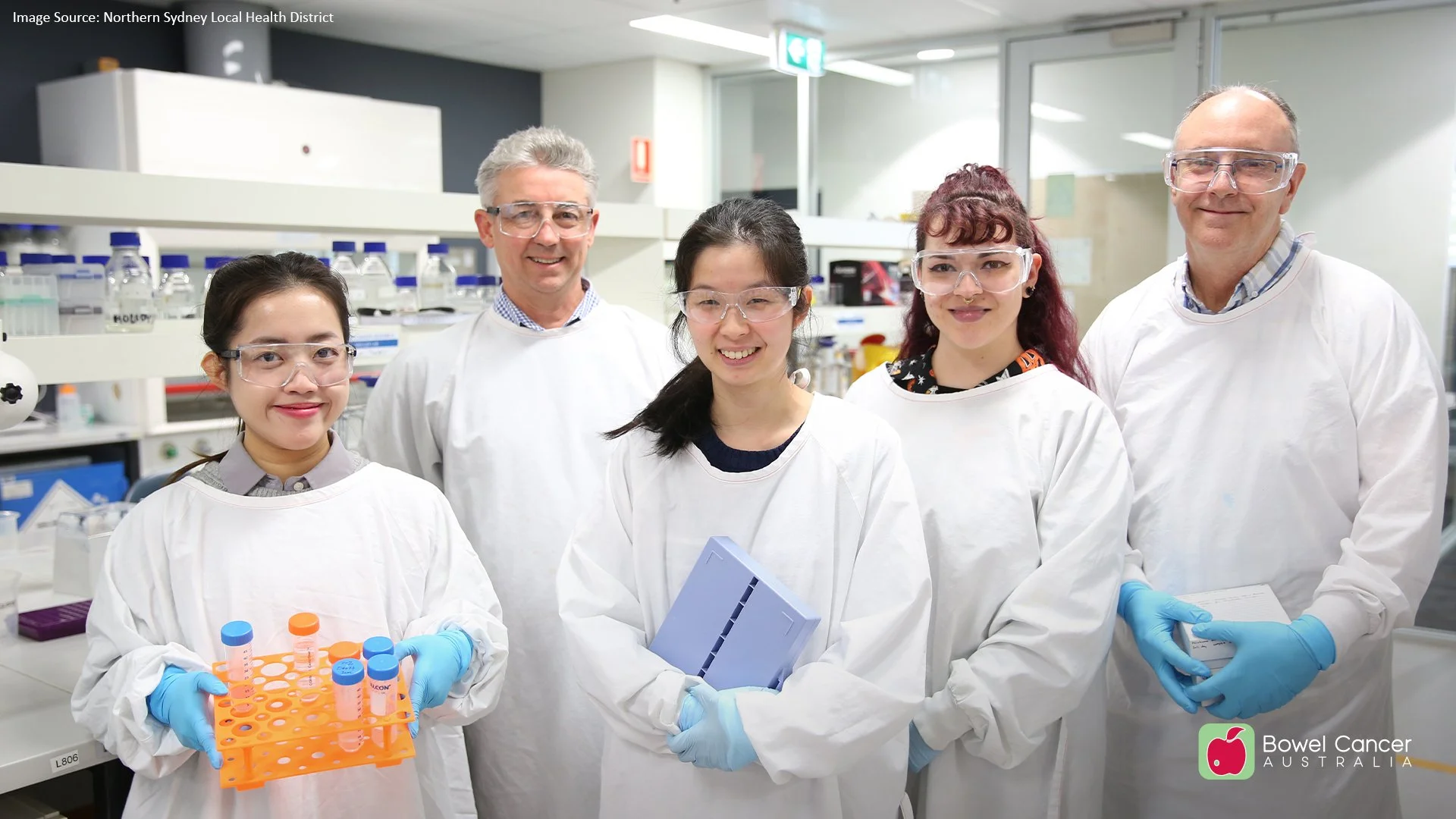
Driving bowel cancer discoveries
Vale Penelope Morris AM
The passing of our colleague and friend, Penelope Morris AM, in May 2025, was a time of deep sadness.
Penny was the longest-serving director and a valued member of Bowel Cancer Australia’s board, having been appointed in November 2006.
We will be forever grateful for her service and generosity.
In May 2013, Penny was appointed Director of the Bowel Cancer Research Foundation and assumed the role of Chair in June 2022.
Both as Chair and through her personal Foundation, Penny was passionate in her support of the Lawrence Penn Chair of Bowel Cancer Research.
We extend our condolences to Penny’s husband, Paul, and her family.
Seventh year of Professor Mark Molloy’s appointment as the Lawrence Penn Chair of Bowel Cancer Research.
The University of Sydney’s $10.4 million partnership with Bowel Cancer Australia provides a vital platform for accelerating global efforts to reduce the burden of bowel cancer through pioneering research.
In 2025, the Bowel Cancer Research team achieved significant milestones, publishing three key studies that advance our understanding of bowel cancer:
1. Gut microbiome and bowel polyp growth
Investigating how microorganisms in the gut influence the development of bowel polyps.
2. Gene mutation signatures in small adenomas
Identifying genetic changes in certain small polyps that carry a higher cancer risk.
3. Prognostic protein signature in advanced colorectal liver cancer
Discovering molecular markers that help predict patient outcomes.
These findings stem from the Integrated Molecular Analysis of Polyps (IMAP) Study, initiated by Professor Mark Molloy in 2019.
Key findings from this research:
Polyp size is not a reliable risk indicator – Size alone does not predict genetic mutations, so caution is needed when using size for surveillance decisions.
Three oncogenic pathways identified – These may serve as future markers for assessing bowel cancer risk.
Gut microbiome as a driver of cancer growth – The area around polyps is a micro-inflammatory zone where certain microbes thrive. Controlling these microbes could slow cancer progression; this is being tested in animal studies.
New molecular signature for survival prediction – This helps explain why outcomes vary among patients with advanced colorectal liver metastases.
By improving our ability to identify high‑risk polyps, understand how the gut microbiome drives disease, and refine prognostic tools for advanced cancers, this research moves us closer to earlier detection, more accurate risk assessment, and more personalised treatment strategies.
Click here for a full list of research publications.
Professor Molloy was featured in the 2024 revision of Stanford University’s
Top 2% Scientists list, which recognises researchers based on their publication track record and impact in their respective fields.

Impact
& research achievements (2018-2025)
Lawrence Penn Chair of Bowel Cancer Research
-
Awards include funding from NHMRC, ARC, NSW Health, Cancer Council NSW, Cancer Institute NSW, and Tour de Cure.
-
Enabling one of Australia’s most comprehensive multi‑omic datasets on early‑stage bowel cancer. These biospecimens continue to underpin publications, student projects, and translational discoveries.
-
International peer-reviewed journals spanning polyp genomics, microbiome discovery, immune biology, and advanced cancer biomarkers — establishing the Lawrence Penn Chair program as a major contributor to global knowledge on bowel cancer development and metastasis.
-
Accelerating Australia’s role in international bowel cancer research through new global collaborations enabling studies of scale.
Building long term research capacity in genomics, proteomics, immunology and microbiome research helping Australia contribute and compete on the world stage.
-
The team uncovered that some bowel polyps grow within micro‑inflammatory niches where harmful gut pathogens are known to reside. Understanding how these microbes influence early cancer development may open a new avenue for prevention.
The team has established that the diabetes drug metformin triggers protective immune responses against bowel cancer growth. These findings are shaping future trials that combine immune modulating drugs and microbiome targeted interventions to prevent cancer earlier than ever before.
-
The IMAP clinical study revealed small-sized bowel polyps can carry the same high‑risk driver mutations as large polyps, disproving long‑held assumptions that early polyps reflect low risk of cancer growth. This breakthrough offers a path toward molecularly informed colonoscopy intervals — ensuring high‑risk patients are monitored more frequently.
Genomic, microbial, and immune signatures discovered through the IMAP clinical study are being developed into potential screening and risk‑stratification tools.
-
Through proteomic analysis of advanced bowel cancers that had spread to the liver, the team identified three new molecular phenotypes linked to disease recurrence and long‑term survival. These findings could help clinicians better determine who benefits from complex liver surgery and who may require alternative treatment pathways.
We raised funds to continue our life-saving work and inspired others to do the same

Thank you to our
sponsors and supporters
We work hard to maximise every dollar donated to driving our advocacy, awareness, support, and research initiatives so as to deliver the greatest potential benefit for people living with and beyond bowel cancer and their loved ones.
Our dedication to efficiency and accountability has always been a core value of Bowel Cancer Australia and continues to underpin everything we do.
We continue to invest our resources strategically in high-impact areas of unmet need.
Gross Income
Donations and bequests: $4,720,770.00
Revenue from providing goods or services: $264,833.00
Revenue from government including grants: $892,078.00
Revenue from investments: $315,447.00
All other revenue: $36,000.00
Total revenue: $6,226,128.00
Other income (for example, gains): $374,720.00
Total gross income: $6,603,848.00
Expenses
Employee expenses: $920,911.00
Interest expenses: $16,758.00
Grants and donations made for use in Australia: $259,965.00
Grants and donations made for use outside Australia: $0.00
All other expenses: $3,386,819.00
Total expenses: $4,584,453.00
Net surplus/(deficit): $2,019,395.00
Other comprehensive income: $0.00
Total comprehensive income: $2,019,395.00
Assets
Total current assets: $11,372,120.00
Non-current loans receivable: $0.00
Other non-current assets: $310,476.00
Total non-current assets: $310,476.00
Total assets: $11,682,596.00
Liabilities
Total current liabilities: $1,312,138.00
Non-current loans payable: $0.00
Other non-current liabilities: $193,329.00
Total non-current liabilities: $193,329.00
Total liabilities: $1,505,467.00
Net assets/liabilities: $10,177,129.00



